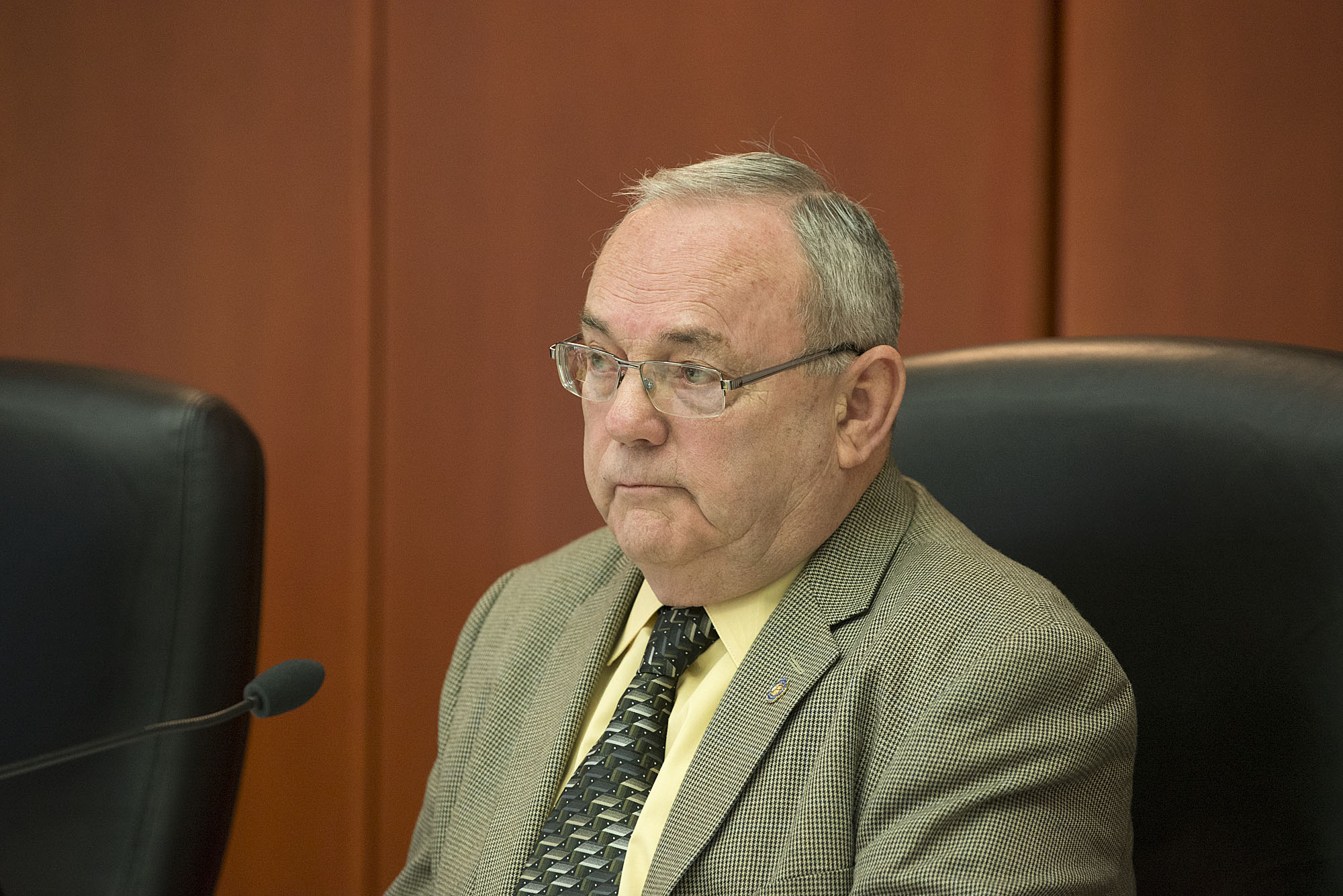In a parting shot just months before he is slated to retire, Clark County Councilor Tom Mielke filed three recall petitions against the majority voting bloc of the Clark County Council.
In three letters Mielke filed with the Clark County Elections Office on Tuesday morning, the Republican councilor repeats allegations that Council Chair Marc Boldt and Councilors Jeanne Stewart and Julie Olson “committed acts of malfeasance, misfeasance and violated (their) oath of office.”
Mielke details concerns over the hiring of an investigator to look into allegations leveled against Republican Councilor David Madore, the council’s decision to award the contract for legal advertising to The Columbian, County Manager Mark McCauley’s dissolution of the Environmental Services Department, and limited access to lawyers as examples of alleged wrongdoing.
The 10-page letters, nearly identical for all three councilors, read like a summary of the ongoing political theater in Clark County since Olson, a Republican, and Boldt, no party preference, took office in January. They, along with Republican Stewart, have consistently voted in favor of a number of county policies this year, leaving Mielke and Madore on the losing end of a number of 3-2 votes.
Boldt, when reached for comment Tuesday afternoon, said he was unconcerned about the complaint. In fact, he said “it makes me kind of proud of what we’ve done the last six months.”
“Anyone can do (a recall petition),” Boldt said. “I honor the process and whatever happens from that will happen.”
Olson echoed Boldt, saying Mielke has a right to file a complaint, but called it “meritless and baseless.”
“This is the depth they’ll go to try to pressure and intimidate people that disagree with them,” she said. “In the long run, I’m going to continue to do the work.”
Stewart could not immediately be reached for comment.
Allegations made
In his letter, Mielke points out four examples he said will show wrongdoing by his fellow councilors. The allegations center around numerous occasions he alleged prove the three councilors colluded and violated the Open Public Meetings Act.
Mielke details, for example, Madore’s allegations that Community Planning Director Oliver Orjiako and county legal staff lied about details of the Comprehensive Growth Management Plan update.
Mielke alleges that Olson, Boldt and Stewart met in secret to discuss granting a contract to Seattle attorney Rebecca Dean that turned “the investigation on its head” by instead investigating a whistleblower and harassment complaint Orjiako filed against Madore.
Such actions, Mielke wrote, would be a violation of the Open Public Meetings Act.
While it’s true that McCauley did hire Dean at an hourly rate of $240 an hour to investigate the allegations against Madore, her contract shows she is also tasked with investigating Madore’s allegations against county staff. She is also investigating a third complaint by public employee guild AFSCME against Madore, which alleges his work on the Comprehensive Growth Management Plan Update should have been performed by workers represented by the union.
Furthermore, the Clark County Home Rule Charter gives all authority to sign and execute contracts to the county manager. Though the council has a policy that dictates contracts should be put online for councilors to review before they’re signed, McCauley did not list the contract on the county’s website, a move he defended due to the nature of the contract.
Mielke also claimed the other three councilors granted The Columbian a legal advertising contract as a reward for coverage critical of him and Madore.
“Councilor Boldt’s, Stewart’s and Olson’s votes were not cast in favor of The Columbian because it was the better selection,” Mielke wrote. “Rather, the three councilors supported the lucrative contract as a quid pro quo for unfavorable political coverage of their political adversaries, Councilor Madore and myself, and favorable coverage of themselves.”
Mielke also accused the councilors of preventing Madore and Mielke from turning to the Clark County Prosecutor’s Office for legal advice. The county’s rules of procedure, adopted last month, require that requests for formal legal opinions be presented to the board in writing and approved by the county manager, board chair or a majority of the council.
“The section in the ordinance — and its application preventing access to legal counsel — is a violation of the rights of minority councilors,” Mielke wrote.
Finally, Mielke accuses Boldt, Stewart and Olson of “(colluding) in secret in violation of the (Open Public Meetings Act)” in order to dissolve the Environmental Services Department. Environmental Services Director Don Benton, who was controversially appointed to the position by Madore and Mielke, and three other employees in that department were laid off. All other employees and duties of the department will be reassigned to other county offices.
“The BOCC held no meetings and took no action with respect to the dissolution of the department,” Mielke wrote.
However, the county charter grants McCauley complete authority over the creation, dissolution and consolidation of county departments.
Olson and Boldt denied the allegations of collusion and violations of the Open Public Meetings Act.
“Never happened,” Olson said. “Never.”
Recall process
Recall efforts are a lengthy process in Washington. The county prosecutor has 15 days after receiving a charge to write a ballot synopsis.
The charge and ballot synopsis are then sent along to Superior Court. Within 15 days, a judge will consider whether the charges, if true, amount to misfeasance, malfeasance or a violation of the elected official’s oath of office.
Misfeasance means performing a duty in an improper manner. Malfeasance is the commission of an unlawful act. Violating the oath of office means neglecting or knowingly failed to perform their duties. Any of the three or a combination could prompt a judge to find the petition valid.
Those elected officials who are the subject of the recall may appeal the decision to the state Supreme Court. If the case is upheld, the next stage is the petition process. Petitioners would have to collect an number of signatures equal to 25 percent of the total number of votes cast in the last election for that office, according to state election laws.
That means petitioners would need to collect 20,639 signatures for a recall of Boldt, 6,097 for a recall of Olson, and 29,901 for a recall of Stewart. (Olson was elected by district; the other two were elected countywide.)
A validated petition would trigger a special recall election.




